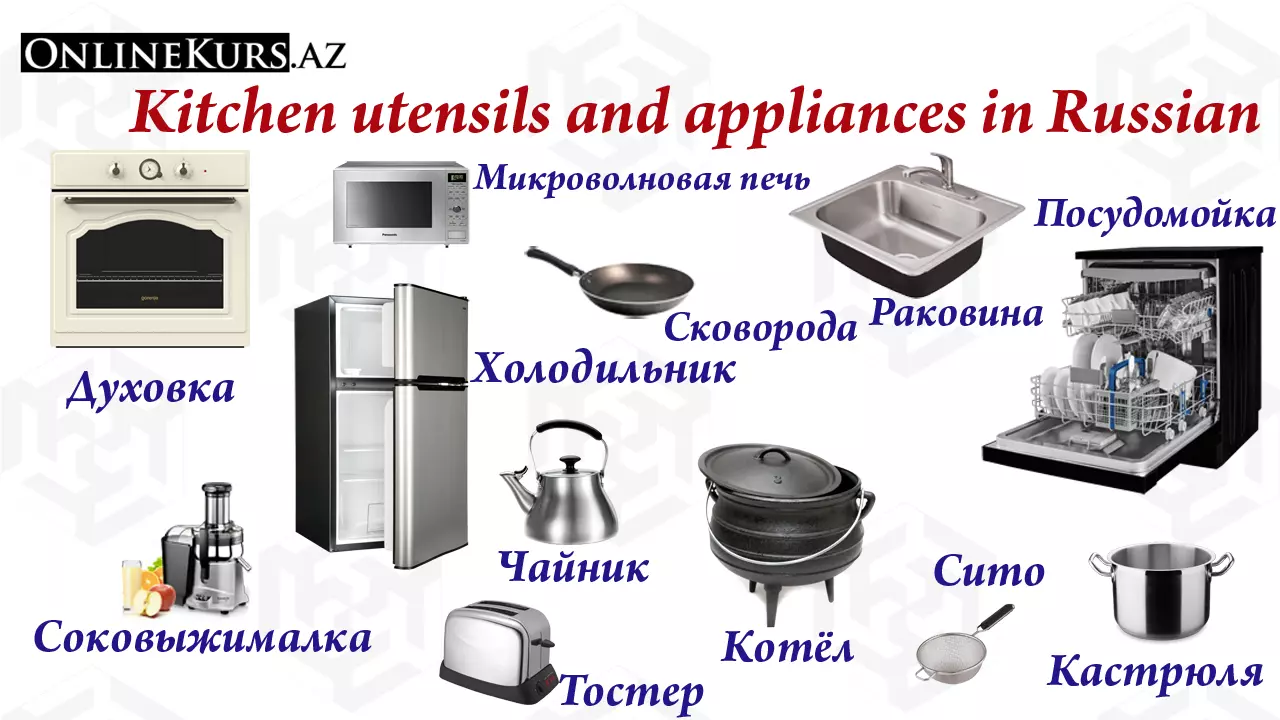Kitchen utensils and appliances in Russian
Vocabulary is one of the important parts for learning the Russian language. Vocabulary includes common words that we can use in daily life. Kitchen utensils in Russian is a part of the vocabulary used in everyday life. If you are interested in learning names of kitchen utensils in Russian, this place will help you learn kitchen utensils and appliances in Russian. The topic of Kitchen utensils in Russian is used in everyday life conversations, so it is very important to learn all the Russian names of kitchen utensils. Translations of Russian vocabulary for kitchen utensils are given in the video below.
Russian vocabulary for kitchen utensils
Today we will tell you about the topic of Russian vocabulary for kitchen utensils. All you have to do is print out the list of words given in the article, go to your kitchen, make yourself a cup of tea or coffee, and learn Russian vocabulary for kitchen utensils topic right there in the kitchen. Below is a vocabulary list of many kitchen utensils in Russian, from modern electric kitchen gadgets to time-tested kitchen staples.
While most of these utensils are used in single-purpose variants such as dessert fork, oyster fork, and other, to name these utensils in Russian simply add "для" ( "for" ) followed by the dish or food designed for it, for example, "вилка для креветок" ( "shrimp fork" ). You can also add descriptive words like "десертная" or "столовая" in front of the word: "десертная вилка" ( "dessert fork" ).

Russian proverbs about kitchen utensils
"Битая посуда два века живёт" - Broken dishes live for two centuries ( Broken plates and other dishes were not thrown away in poor families. On the contrary, it was treated more carefully so that it did not completely disintegrate. And such items can still serve for decades. This proverb should be understood as follows: Once who had a problem, who failed, henceforth he will be more careful, more cautious and will be able to successfully continue the work he started. )
"Пустая ложка губы царапает" - Empty spoon scratches lips
"В малой посуде все кажется крупней" - Everything looks bigger in a small dishes
"Свою болезнь нашел на дне тарелки " - I found my disease at the bottom of the plate ( The meaning of the proverb states that it is harmful to a person eat too much. Eat less, not to the bottom of the plate, you will not get sick.)
Russian spelling and pronunciation of kitchen utensils
|
|
[ к`ухн’а ] | Kitchen |
|
|
[ дух`офка ] | Oven |
|
|
[ пл’ита ] | Stove |
|
|
[ халад’`ил’н’ик ] | Fridge |
|
|
[ мараз’`ил’н’ик ] | Freezer |
|
|
[ м’икравалн`овай’а п’`эч’ ] | Microwave oven |
|
|
[ пасудам`ой’ка ] | Dishwasher |
|
|
[ т`ост’ир ] | Toaster |
|
|
[ сакавыжым`алка ] | Juicer |
|
|
[ ч’`ай’н’ик ] | Kettle |
|
|
[ п’`эп’ил’н’ица ] | Ashtray |
|
|
[ м’`иска ] | Bowl |
|
|
[ ч’`ашка ] | Cup |
|
|
[ салф’`этка ] | Napkin |
|
|
[ стак`ан ] | Glass |
|
|
[ куфшын ] | Jug |
|
|
[ в’`илка ] | Fork |
|
|
[ н`ош ] | Knife |
|
|
[ л`ошка ] | Spoon |
|
|
[ ч’ирп`ак ] | Ladle |
|
|
[ скаварада ] | Pan |
|
|
[ кат’`ол ] | Pot |
|
|
[ кастр’`ул’а ] | Saucepan |
|
|
[с`ахарн’ица ] | Sugarpot |
|
|
[ зав`арач’ный’ ч’`ай’н’ик ] | Teapot |
|
|
[ тар’`элка ] | Plate |
|
|
[ бл’`уцэ ] | Saucer |
|
|
[ сал`онка ] | Salt cellar |
|
|
[ с’`ита ] | Sieve |
|
|
[ р`акав’ина ] | Sink |
|
|
[ падн`ос ] | Tray |
We believe that the education should be free and available to everybody. This is why some time ago, we made a decision to continue developing as a completely free network. But we need the support of our readers to continue creating new content, keep the development going and pay related expenses. If you like what we do and find it helpful, consider supporting us by making a donation to our accounts.
